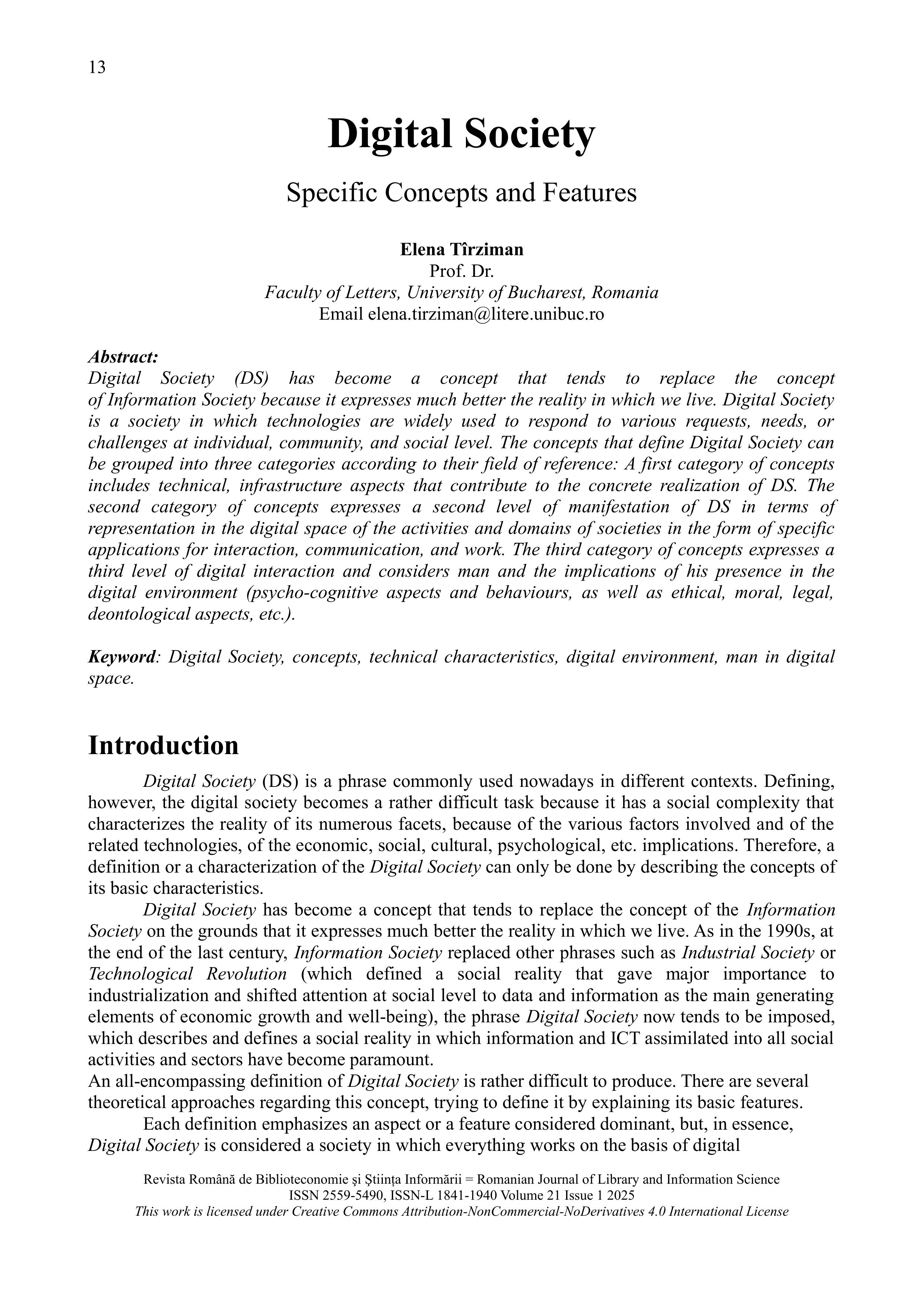Digital Society: Specific Concepts and Features
Specific Concepts and Features
DOI:
https://doi.org/10.26660/rrbsi.2025.21.1.03Keywords:
Digital Society, concepts, technical characteristics, digital environment, man in digital spaceAbstract
Digital Society (DS) has become a concept that tends to replace the concept
of Information Society because it expresses much better the reality in which we live. Digital Society is a society in which technologies are widely used to respond to various requests, needs, or challenges at individual, community, and social level. The concepts that define Digital Society can be grouped into three categories according to their field of reference: A first category of concepts includes technical, infrastructure aspects that contribute to the concrete realization of DS. The second category of concepts expresses a second level of manifestation of DS in terms of representation in the digital space of the activities and domains of societies in the form of specific applications for interaction, communication, and work. The third category of concepts expresses a third level of digital interaction and considers man and the implications of his presence in the digital environment (psycho-cognitive aspects and behaviours, as well as ethical, moral, legal, deontological aspects, etc.).
References
Bobrowicz-Campos, E. and Matos, A.P.M. (2020) ‘Ageing and Health in the Digital Society: Challenges and Opportunities’, in Exploring the Role of ICTs in Healthy Aging, IGI Global Scientific Publishing, 34–55, available: https://doi.org/10.4018/978-1-7998-1937-0.ch003, [accessed: 4.10.2022].
Bucher, T. (2018) If...Then [online], Oxford University Press, available: https://doi.org/10.1093/oso/9780190493028.001.0001.
Budea, A.M.S. and Budea, A.M.S. (1 AD) An Approximation in the Study of Communication Research: Digital Evolution and the Study of This Subject in Spanish Academic Journals [online], https://services.igi-global.com/resolvedoi/resolve.aspx?doi=10.4018/978-1-7998-4930-8.ch016, available: https://doi.org/10.4018/978-1-7998-4930-8.ch016 [online], [accessed: 4.10.2022].
Carin, B. (2017) ‘G20 safeguards digital economy vulnerabilities with financial sector focus’, Economics Discussion Papers, Economics Discussion Papers, available: https://ideas.repec.org//p/zbw/ifwedp/201727.html [accessed 30 July 2025].
European Commission (2012) UE al drepturilor în mediul online [online], Publications Office of the European Union, available: https://data.europa.eu/doi/10.2759/93566 [accessed 3 Aug 2025].
Floridi, L. and Sanders, J.W. (2004) ‘On the Morality of Artificial Agents’, Minds and Machines, 14(3), 349–379, available: https://doi.org/10.1023/B:MIND.0000035461.63578.9d.
Gillespie, T. (2021) ‘Custodians of the Internet’, Yale University Press, available: https://yalebooks.yale.edu/book/9780300261431/custodians-of-the-internet/ [accessed 3 Aug 2025].
Gorwa, R. (2019) ‘What is platform governance?’, Information, Communication & Society, 22(6), 854–871, available: https://doi.org/10.1080/1369118X.2019.1573914.
Hildebrandt (Mireille) (2020) Smart Technologies [online], available: https://doi.org/10.14763/2020.4.1531.
Jamil, M.I.M. and Almunawar, M.N. (2021) ‘Importance of Digital Literacy and Hindrance Brought About by Digital Divide’, in Encyclopedia of Information Science and Technology, Fifth Edition, IGI Global Scientific Publishing, 1683–1698, available: https://doi.org/10.4018/978-1-7998-3479-3.ch116.
Katzenbach (Christian) and Christian, B. (Thomas (2019) Defining Concepts of the Digital Society [online], available: https://doi.org/10.14763/2019.4.1430, [accessed: 4.10.2022].
Katzenbach (Christian) and Ulbricht (Lena) (2019) Algorithmic Governance [online], available: https://doi.org/10.14763/2019.4.1424, [accessed: 4.10.2022].
Lokshina, I.V., Lanting, C.J.M., Durkin, B., Lokshina, I.V., Lanting, C.J.M., and Durkin, B. (1 AD) Evaluation of Strategic Opportunities and Resulting Business Models for SMEs: Employing IoT in Their Data-Driven Ecosystems [online], https://services.igi-global.com/resolvedoi/resolve.aspx?doi=10.4018/978-1-7998-2355-1.ch007, available: https://doi.org/10.4018/978-1-7998-2355-1.ch007, [accessed: 4.10.2022].
Muchnik-Rozanov, Y. and Tsybulsky, D. (2020) ‘Linguistic Analysis of Science Teachers’ Narratives Using AntConc Software’, in Advancing Educational Research With Emerging Technology, IGI Global Scientific Publishing, 211–230, available: https://doi.org/10.4018/978-1-7998-1173-2.ch010, [accessed: 4.10.2022].
Palvia, S. (2007) ‘E-Government and E-Governance: Definitions/Domain Framework and Status around the World’, Foundation of e-government, available: https://www.academia.edu/103494230/E_Government_and_E_Governance_Definitions_Domain_Framework_and_Status_around_the_World [accessed 3 Aug 2025].
Poell (Thomas), Nieborg (David), and Dijck (José), van (2019) Platformisation [online], available: https://doi.org/10.14763/2019.4.1425, [accessed: 4.10.2022].
Sá, M.J., Santos, A.I., Serpa, S., and Ferreira, C.M. (2021) ‘Digital Literacy in Digital Society 5.0: Some Challenges’, Academic Journal of Interdisciplinary Studies, 10(2), 1, available: https://doi.org/10.36941/ajis-2021-0033, [accessed: 4.10.2022].
X.1205 : Overview of Cybersecurity [online] (2025) available: https://www.itu.int/rec/T-REC-X.1205-200804-I [accessed 30 July 2025].

Published
How to Cite
Issue
Section
License
Copyright (c) 2025 Romanian Library Association

This work is licensed under a Creative Commons Attribution-NonCommercial-NoDerivatives 4.0 International License.
All articles from RRBSI are licensed under a Creative Commons Attribution-NonCommercial-NoDerivatives 4.0 International (CC BY-NC-ND 4.0) License.





